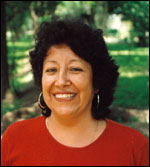|
Maria Elena Foronda Farro was born to be an activist. Her father, a union lawyer in Chimbote, Peru, taught her -- through words and by example -- about the importance of social justice. Foronda, who grew up in Chimbote and earned a master's degree in sociology in Mexico, is now applying her father's lessons to her hometown.
Peru is the world's largest producer of fishmeal, a substance used in fertilizers and animal feed, and the industry dominates Chimbote and other coastal towns. Many of the factories are located in the middle of residential areas, where they pollute the air with soot. They also discharge fish remains, oils, and proteins into public drains, often blocking them and flooding the streets with wastewater. Irresponsible industry practices are linked to serious health problems in Peru, including a cholera epidemic in the early 1990s; the life expectancy in Chimbote is 10 years shy of the national average. The industry has also been a disaster for the environment. Factories decimate fisheries with bottom-net dragging and dump heated water into the ocean, creating dead zones along the coast.
Foronda, 44, has worked to empower neighbourhoods affected by the fishmeal industry. Through projects such as the School of Leaders for Local Development, an environmental leadership program, Foronda says many residents have become more aware of their legal rights to a clean environment, and are demanding that the government and the fishmeal industry recognize those rights.
Such work is dangerous in Peru: In 1994, Foronda and her husband were falsely accused of membership in the terrorist group Shining Path and sentenced to 20 years in prison. Thanks to local and international campaigns, the couple was released after about a year, and Foronda has returned to her work in Chimbote. She continues to encourage activism in local communities, and she and others at NATURA, the nongovernmental organization she founded, have helped convince eight fishmeal producers to clean up their practices.
On April 14, Foronda was awarded one of six 2003 Goldman Environmental Prizes. Because of visa problems, she could not attend the ceremony in San Francisco; her father attended on her behalf. She spoke with Grist via an email correspondence in Spanish.
|


